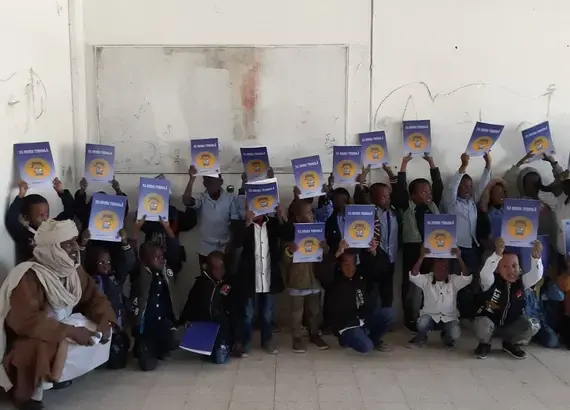
Success Story
Lifting Black Voices Across the MENA Region
The protests in the United States sparked by the high-profile deaths of George Floyd and other Black Americans have evoked widespread sympathy across the Middle East and North Africa (MENA) and comparisons to the anti-government protest movement in the region in recent years. However, when it comes to the widespread racial discrimination towards Black communities in the Arab world, there has been little acknowledgement of the need to address the issue. There has long been a culture of silence in the region, which only in recent years has started to change and be discussed more widely in the public domain. Given the long history of slavery in the region, with some countries only abolishing the practice as recently as the 1960s, and the Kafala system in many countries where migrant domestic workers, many from African countries, are excluded from local domestic labor laws and protective regulations for workers, Black communities face higher rates of poverty, lack of opportunities for advancement and frequent disenfranchisement from participation in politics.
A number of NDI’s initiatives in the MENA region aim to increase political engagement by Black communities, elevating their voices in politics and helping them to advocate for issues affecting their communities. NDI’s programming in Libya, for example, has focused on working with three ethnic groups, located in the south of the country: the Amazigh, Tebu and Tuareg. Through direct support to local civil society organizations (CSOs) representing these groups, NDI helped to increase their engagement in local and municipal elections, as well as raise awareness and advocate for reforms and policies to improve their communities. Since 2018, through funding from USAID, the Institute has assisted Tebu activists in their efforts to introduce their mother language to local schools. Relying on skills developed from NDI workshops and their understanding of the relevant landscape, Tebu activists built support among Tebu leaders and advocated for the inclusion of their Tudaga language in the educational curriculum, sending letters to and holding meetings with local and national-level officials of the Ministry of Education. Tebu activists also drafted textbooks that were distributed in 10 pilot schools across Tebu areas, and classes began through direct arrangements with school administrators. To help advance their efforts, in late 2019, USAID and NDI printed 6,000 copies of the textbooks and workbooks, and implemented a training curriculum and distribution plan, which included an experience-sharing workshop between Tebu and Amazigh activists who had successfully introduced their language to the school system For more information on NDI’s program in Libya, check out the latest webstory, “NDI Tebu activists bring indigenous language to classrooms in southern Libya.”
In Iraq, the Black Iraqi community is one of the largest minorities not officially protected or recognized in the country’s constitution, which has specific protections for smaller religious and ethnic groups; while other groups with estimated populations of 500,000 have protections, the estimated community of 2,000,000 Black Iraqis is unrecognized. Moreover, there are no members of the Black community in any leadership roles in government or the military, and they face limited opportunities for education and advancement. The Institute has recently started working with the Freedom Supporters Assembly (FSA), a CSO based in Basra that aims to support Black Iraqis in running for office and potentially establish a registered political party representing community issues. Political engagement among the Iraqi Black community continues to be low, with activists citing a lack of trust between representatives of the community, and disagreements over the necessity of political engagement. The community also faces financial challenges in mobilizing a political party, given the fees required to form one. Despite these challenges, the FSA continues to increase engagement and advocate for the issues impacting the Black Iraqi community. To date, NDI has held virtual workshops on citizen outreach and platform development and aims to broaden its activities with the Iraqi Black community by working with FSA and similarly focused local CSOs.
In 2018 NDI also assisted the Machrou3 Tounes political party in holding a “listening circle” with civil society representatives, individual citizens and victims of racial discrimination in Tunis regarding a draft parliamentary bill on the elimination of racial discrimination. NDI moderated the discussions and ensured contributions from all participants. Following this activity, the participants prepared a draft amendment to the bill which was presented to the president of Machrou3 Tounes. The bill was later presented to the Tunisian parliament and passed in October of 2018. This bill remains of paramount importance for victims of racial discrimination who have noted the urgency of the need for it. NDI prepared a video to highlight the content of the listening circle on the draft law in an accessible online format, and as part of the group’s efforts to better communicate their work inside and outside the parliament.
At a time when the world is focused on racial injustices, NDI remains committed to working with Black communities in the Middle East to ensure their voices are heard, they are included in political discourse and they are equipped to advocate for their community’s concerns. The Institute will continue to engage with local CSOs, party activists and key stakeholders engaged in supporting the Black community across the MENA region.



